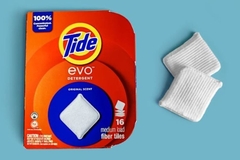EU grants Cellugy €8M funding to replace petrochemicals in cosmetics

Cellugy has received €8.1 million (US$9.47 million) in funding from the EU’s Life Program to accelerate the commercialization of its petrochemical alternative rheology modifier. The Danish biotech company says its EcoFlexy Rheo is biodegradable and created to replace fossil-derived carbomers and acrylates in personal care products.
Personal Care Insights speaks with Isabel Alvarez-Martos, co-founder and CEO of Cellugy, about the ingredient, what the company is putting the grant toward in the short and long term, and how it expects to transform the industry.
“By 2034, the project aims to prevent the annual release of 1,289 metric tons of microplastics. To achieve this expected impact, the project will focus on scaling production, optimizing processes, and securing commercial validation of EcoFlexy, positioning it as a game-changer in the personal care industry.”
“This grant provides the resources to transform our vision into reality. We expect to generate significant revenue within three to five years while delivering a measurable environmental impact,” says Alvarez-Martos.
The grant is given to Cellugy in partnership with The Footprint Firm and Sic2Sci. Led by Cellugy, the consortium unites experts in biotechnology, sustainability, and data management.
Alvarez-Martos explains that The Footprint Firm will oversee the project’s environmental impact, ensuring compliance with circular economy principles. Sic2Sci will implement FAIR data management, machine learning, and artificial intelligence for the production process optimization.
“Scaling EcoFlexy production for commercial launch is a top priority. The incredible demand we have already seen from the beauty industry underscores the urgency of ramping up our production capacity.”
 Cellugy says that 70% of rheology modifiers on the current market originate from petrochemicals.Ditching fossils
Cellugy says that 70% of rheology modifiers on the current market originate from petrochemicals.Ditching fossils
Rheology modifiers — used for thickeners and viscosity in skin care — are a core ingredient in personal care. Cellugy says that 70% of rheology modifiers on the current market originate from petrochemicals, and 87% of beauty products contain microplastics.
These chemicals harm aquatic life as they spread into water streams, pollute the environment, enter our food systems, and directly impact human health.
Alvarez-Martos stresses that petrochemicals present a complex dilemma for the beauty industry.
“They are instrumental in delivering the high-performance products consumers crave, providing desirable qualities like smooth textures, long-lasting wear, and effective application. Ingredients such as acrylic acid copolymers, polyethylene glycol, polyurethane, and silicone oils are ubiquitous in formulations, from luxurious foundations to enduring lipsticks.”
She says this reliance on petrochemicals is deeply ingrained in the industry’s current formulation practices.
“However, the environmental and potential health implications are undeniable. Derived from fossil fuels, they contribute to climate change and plastic pollution. Microplastics, in particular, pose a significant threat to aquatic life and, ultimately, to the human food chain. These substances persist in the environment and can bind harmful chemicals like phthalates and BPA, amplifying their negative impact.”
The beauty industry faces a formidable challenge in transitioning away from petrochemicals, and finding sustainable alternatives that match the performance of synthetic ingredients is complex and costly, according to Alvarez-Martos.
“Additionally, reformulating beloved products without compromising consumer satisfaction requires substantial investment in research and development. Nevertheless, the growing consumer demand for clean and ethical beauty products drives innovation and creates opportunities for brands to lead the industry in sustainable practices.”
 Alvarez-Martos says the ingredient allows for greater customization and personalization of products.Not only for the planet
Alvarez-Martos says the ingredient allows for greater customization and personalization of products.Not only for the planet
The ingredient, EcoFlexy Rheo, is an example of how biotechnology is revolutionizing the beauty industry.
Cellugy uses biotechnology to create more natural, bio-based, and biodegradable ingredients, leading to safer, more effective, and environmentally friendly alternatives to traditional petrochemicals.
Alvarez-Martos says it also allows for greater customization and personalization of products, tailoring formulations to individual skin types and needs. “It represents the future of green innovation in personal care.”
“It is a versatile and powerful rheology modifier with broad applications across the entire personal care spectrum. Its exceptional thickening and stabilizing properties make it ideal for various product categories, including skin, hair, and sun care, and vibrant color cosmetics.”
“This bop-based and biodegradable solution creates stable, high-quality products, even under challenging conditions.”
A promising future?
The future of petrochemical alternatives in cosmetics seems promising, driven by a convergence of technological advancements, evolving consumer demands, and increasing regulatory pressures.
Alvarez-Martos says advancements in biotechnology and fermentation are the most exciting breakthroughs for the industry.
 New technology, demand, and regulatory pressure drive the industry away from petrochemicals. “The ability to harness microorganisms and biological systems to produce highly functional and sustainable ingredients will continue to grow exponentially. Biotechnology allows for creating ingredients with precise molecular structures and enhanced efficacy.”
New technology, demand, and regulatory pressure drive the industry away from petrochemicals. “The ability to harness microorganisms and biological systems to produce highly functional and sustainable ingredients will continue to grow exponentially. Biotechnology allows for creating ingredients with precise molecular structures and enhanced efficacy.”
Furthermore, the industry embraces circular economy principles by turning waste streams from other industries, like food and agriculture, into valuable cosmetic ingredients. She further details that advanced green chemistry technologies will continue to reduce the environmental footprint of ingredient manufacturing.
“It includes developing safer solvents, using energy-efficient processes, and designing inherently biodegradable and non-toxic ingredients throughout their lifecycle.”
She adds that governments and regulatory bodies worldwide are implementing stricter guidelines around sustainability and the use of harmful chemicals.
“This will further incentivize cosmetic companies to invest in and adopt petrochemical alternatives. In essence, the future of petrochemical alternatives in cosmetics is bright, driven by intelligent, bio-inspired solutions that prioritize both planetary health and unparalleled product performance.”
Alvarez-Martos concludes that we will see the transformation needed to protect both human health and our planet only when bio-based materials match or exceed the performance and economics of traditional ingredients.













